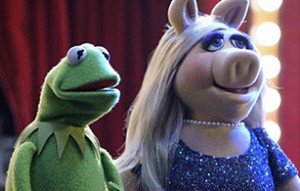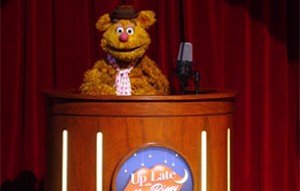The Muppets 1.01: “Pig Girls Don’t Cry”
As you might have guessed by this point, I am an enormous Muppets fan. In fact, I can say without any hesitation that I would be a very different person without them, and as a devoted fan, I will will pounce on any new Muppets project with the same level of enthusiasm I did when I was tiny. At the same time, as any obsessive Muppet fan will tell you, any post-Jim-Henson production also brings with it a feeling of trepidation. Without him around to guide these unique characters, will this newest iteration be able to capture his spirit and heart, and his sense of “gentle anarchy,” as Frank Oz has referred to it?
And the post-Jim track record has been a bit spotty. In most cases, I feel like they have gotten the heart right. The Muppet Christmas Carol is a perfect example of this. It’s warm, it’s sweet, and cheekily tweaks the classic story’s conventions. But it doesn’t hit the anarchic heights of Jim’s best work. Whenever his Muppets set out to retell a well-known story, things would go so wrong and be thrown so off track that it would descend into full-on, blissful madness. Muppet Christmas Carol is lovely but in many ways too controlled. Jason Segel’s 2011 film, The Muppets, comes much closer to the right tone, however it also often feels too reverent, treating the characters practically like holy, untouchable figures of legend. It isn’t as much a Muppet film as a rose-colored love letter to the Muppets by a lifelong fan. As such, it’s beautiful, sentimental, kind, and made me feel all of the emotions, but I couldn’t quite put my finger on what was missing until its follow-up film, Muppets Most Wanted, came out in 2014 and delivered everything I now realized I needed again in a Muppets project.
Muppets Most Wanted is hilarious, beautifully written, sometimes tender, but most importantly, completely nuts. Centering on an evil frog hatching an evil, convoluted scheme to take Kermit’s place and rob all of the greatest treasures of Europe while the Muppets are on a world tour, Muppets Most Wanted isn’t afraid to mess with the formula. Rather than treating the Muppets with kid gloves, it allows them to get their hands dirty. It has its sweet moments but it isn’t overwhelmed by them. Filled with rare Muppets cameos, it was the most wonderfully unfettered Muppet production since Jim died because it didn’t seem constantly hampered by the need to honor and uphold his legacy. Paradoxically, it did so effortlessly by just letting the Muppets be the Muppets. In the process, it became the most genuine Muppets production since Jim’s last.
But sadly, it had poor audience turnout and mixed reviews, largely due to most critics having forgotten that the Muppets aren’t and never were a sentimental kiddie act. They were family entertainment back when the phrase didn’t describe sappy, lesson-heavy sitcoms that kids loved and parents suffered through but rather entertainment for the whole family. The adults would laugh at the often sophisticated humor that would fly over the children’s heads, while the kids would giggle at these lovable, fuzzy characters and their silly slapstick and more. Unfortunately, so far from what I’ve seen, ABC’s wonderful new The Muppets–airing at 8 PM eastern time on Tuesday nights–has been receiving a similar reception from critics and largely from the same misconception that Jim Henson–the man who humorously subtitled his second Muppet Show pilot, Sex and Violence, and originally hesitated in getting involved in Sesame Street because he worried it would forever label him as a children’s entertainer–wouldn’t want his characters to do anything even winkingly grown-up. I only hope this time around that audiences will embrace it, because this show is exactly what the franchise needs.
Co-created by Bill Prady (who began his career as a Muppets writer for such projects as The Jim Henson Hour and the Muppet*Vision 3D show at Walt Disney World) and Bob Kushell, The Muppets‘ pilot, “Pig Girls Don’t Cry” exemplifies everything that Jim’s dazzling characters are at their best: wild, frenetic, lovable, hilarious, and mischievious, but never, ever cruel. Back in the late 90s, ABC attempted to remake The Muppet Show as Muppets Tonight, an admirable experiment that never fully clicked because (a) it kept the true stars, Kermit and Miss Piggy, in reserve much of the time and (b) it often felt like a lesser retread rather than a true recalibration of the Muppets for a modern audience. The Muppets, on the opposite end of the spectrum, shakes things up, places itself in a televison context that makes sense for today’s audience–and Jim was all about making his characters relevant to whatever today they happened to be occupying at the time, as well as being forward-thinking, never churning out simple, dusty nostalgia–and also keeps what worked before: the idea of capturing the backstage antics of a fully Muppet-run show.
This time around, it’s a late-night show hosted by Miss Piggy, with all of the other Muppets functioning in various production roles perfectly chosen for them. Kermit is the executive producer, Fozzie the warm-up comic, Gonzo, Rizzo, and Pepe the writing team, the Electric Mayhem the house band, Scooter the talent coordinator, Sam the Eagle the network’s standards and practices guy, Uncle Deadly amusingly the head of wardrobe, Sweetums the cue card holder, and so on and so forth. And this proves to be a brilliant way to actively involve all of the characters, retain the meta showbiz element that has always been key to the Muppets’ success, and feature regular interaction with a variety of human celebrities and actors, while at the same time feeling current.
Other than SNL, musical-comedy-variety shows aren’t really a thing anymore, at least not in the format they were when The Muppet Show was on, and so instead of trying to revive the past, instead the writers wisely gave Piggy a show that one could see airing today, and even more importantly, they actually look forwards by giving a prominent late night ABC talk show position (although the network isn’t named, we know that it shoots at the same studio as Dancing with the Stars, so the implication is clear) to a powerful woman.
And the fact that Piggy is depicted as a celebrity herself is also key. One of my other issues with the movie, The Muppets, was that it conjured up a dark world in which The Muppets had split up years ago and hadn’t been relevant for just as long; in which they were treated like has-beens by most people (although I also understood that it was meant as a meta acknowledgement of the fact that the Muppets don’t have the same level of fame today as they did in the late 70s/early 80s and wasn’t supposed to be taken as canon; in our world, they’ve done numerous projects together since Jim’s death, and one of the Muppet movie conceits is always that they are real actors playing versions of themselves, so the events in them are never “real”). Other Muppet projects in the post-Jim years also depicted them as losers who were never as amazing as they dreamed of being. In Muppets from Space, Piggy, despite acting like a diva, is actually a down-on-her-luck local news anchor with an overly inflated sense of self-worth and delusions of grandeur.
Pages: 1 2



